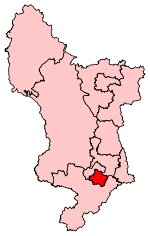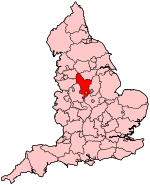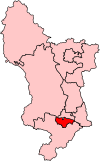| Derby South |
|---|
Borough constituency
for the House of Commons |
 Boundary of Derby South in Derbyshire for the 2010 general election |
 Location of Derbyshire within England |
| County | Derbyshire |
|---|
| Electorate | 72,048 (December 2010)[1] |
|---|
| Major settlements | Derby, Pear Tree |
|---|
| Current constituency |
|---|
| Created | 1950 |
|---|
| Member of Parliament | Margaret Beckett (Labour) |
|---|
| Number of members | One |
|---|
| Created from | Derby |
|---|
Derby South () is a constituency[n 1] formed of part of the city of Derby represented in the House of Commons of the UK Parliament since 1983 by veteran MP Margaret Beckett of the Labour Party. She has served under the Labour governments of Harold Wilson, James Callaghan, Tony Blair and Gordon Brown. She became interim Leader of the Labour Party in 1994 when John Smith suddenly died. She has also served under the leaders of Neil Kinnock and Smith himself. [n 2]
Boundaries

Boundaries of Derby South from 1997 to 2010
1950–1955: The County Borough of Derby wards of Alvaston, Arboretum, Castle, Dale, Litchurch, Normanton, Osmaston, and Peartree.
1955–1974: The County Borough of Derby wards of Alvaston, Arboretum, Castle, Dale, Litchurch, Normanton, Osmaston, and Peartree, and the parish of Littleover in the Rural District of Shardlow.
1974–1983: The County Borough of Derby wards of Alvaston, Arboretum, Babington, Chellaston, Litchurch, Littleover, Normanton, Osmaston, and Peartree.
1983–1997: The City of Derby wards of Alvaston, Babington, Blagreaves, Kingsway, Litchurch, Littleover, Normanton, Osmaston, and Sinfin.
1997–2010: The City of Derby wards of Alvaston, Babington, Blagreaves, Kingsway, Litchurch, Littleover, Mickleover, Normanton, Osmaston, and Sinfin.
2010–present: The City of Derby wards of Alvaston, Arboretum, Blagreaves, Boulton, Chellaston, Normanton, and Sinfin.
Derby city centre has been in this constituency since 1974; from 1950 it had been in Derby North.
The proposals made by the Boundary Commission in 2016 for new constituencies would of seen the wards Aston, Chaddesden, Spondon and Oakwood move into the seat while the wards Arboretum, Normanton and Blagreaves would move to the seat of Derby North.[2] This would notionally make the seat a Conservative seat.[3] If implemented, this would be the first time the city centre has been in Derby North since 1974.
Members of Parliament
Constituency profile
The constituency takes in Derby city centre including much of its varied income inner-city, a narrow majority of which used to be local council-built however which is offset by conservation areas including beside Derby Cathedral and Derby Catacombs. The remainder of the seat is generally more affluent suburbs, and much of the engineering industry traditionally associated with the city.
History
The constituency was created in 1950, when the former two-seat constituency of Derby was split into two single-member seats. Unlike the Derby North seat, this seat has to date been a Labour Party seat.
A notable former MP for the seat was its first incumbent, Philip Noel-Baker of the Labour Party. He served as a Cabinet minister in the post-war Attlee government, and was awarded the Nobel Peace Prize in 1959 for his campaigning for disarmament. He had previously represented the former two-seat constituency of Derby since a by-election in 1936.
The former Cabinet minister Margaret Beckett, who had represented Lincoln (under her maiden name of Margaret Jackson) from 1974 to 1979, has represented Derby South for the Labour Party since 1983. At that election Beckett won the seat with one of the smallest majorities seen of just 421 over the Conservative Party, since which she has achieved only larger majorities than this. The most recent result, in line with other Leave-voting seats, is a reduced majority for Labour, with both the Conservative and Brexit Party candidates increasing their vote share, however Beckett still won a majority (51%) of all votes cast, higher than in the elections between 2005 and 2015, suggesting the seat is a relatively safe seat for the Labour Party.
Elections
Elections in the 2010s
General election 2019: Derby South[5] | Party | Candidate | Votes | % | |
| | Labour | Margaret Beckett | 21,690 | 51.1 | -7.2 |
| | Conservative | Ed Barker | 15,671 | 36.9 | +3.4 |
| | Liberal Democrats | Joe Naitta | 2,621 | 6.2 | +3.5 |
| | Brexit Party | Timothy Prosser | 2,480 | 5.8 | New |
| Majority | 6,019 | 14.2 | -10.6 |
| Turnout | 42,462 | 58.1 | -6.7 |
| | Labour hold | Swing | -5.3 | |
General election 2017: Derby South[6][7] | Party | Candidate | Votes | % | |
| | Labour | Margaret Beckett | 26,430 | 58.3 | +9.3 |
| | Conservative | Evonne Williams | 15,182 | 33.5 | +6.1 |
| | UKIP | Alan Graves | 2,011 | 4.4 | -11.1 |
| | Liberal Democrats | Joe Naitta | 1,229 | 2.7 | -1.5 |
| | Green | Ian Sleeman | 454 | 1.0 | -2.0 |
| Majority | 11,248 | 24.8 | +3.2 |
| Turnout | 45,306 | 64.8 | +6.7 |
| | Labour hold | Swing | +1.6 | |
General election 2015: Derby South[8][9] | Party | Candidate | Votes | % | |
| | Labour | Margaret Beckett | 20,007 | 49.0 | +5.7 |
| | Conservative | Evonne Williams[10] | 11,179 | 27.4 | -1.1 |
| | UKIP | Victor Webb | 6,341 | 15.5 | +11.1 |
| | Liberal Democrats | Joe Naitta[11] | 1,717 | 4.2 | -16.3 |
| | Green | David Foster[12] | 1,208 | 3.0 | New |
| | TUSC | Chris Fernandez[13] | 225 | 0.6 | +0.6 |
| | British Independents | David Gale[14][15] | 143 | 0.4 | +0.4 |
| Majority | 8,828 | 21.6 | +6.8 |
| Turnout | 40,820 | 58.1 | +0.1 |
| | Labour hold | Swing | +3.4 | |
General election 2010: Derby South[16] | Party | Candidate | Votes | % | |
| | Labour | Margaret Beckett | 17,851 | 43.3 | -9.8 |
| | Conservative | Jack Perscke | 11,729 | 28.5 | +8.7 |
| | Liberal Democrats | David Batey | 8,430 | 20.5 | -3.7 |
| | UKIP | Stephen Fowke | 1,821 | 4.4 | +3.0 |
| | Independent | Alan Graves | 1,357 | 3.3 | |
| Majority | 6,122 | 14.8 | |
| Turnout | 41,188 | 58.0 | -6.7 |
| | Labour hold | Swing | -9.25 | |
The vote share changes on 2005 and the turnout figures were notional based on boundary changes.
Elections in the 2000s
General election 2005: Derby South[17][18] | Party | Candidate | Votes | % | |
| | Labour | Margaret Beckett | 19,683 | 45.4 | −11.0 |
| | Liberal Democrats | Lucy Care | 14,026 | 32.3 | +13.0 |
| | Conservative | David Brackenbury | 8,211 | 18.9 | −5.4 |
| | UKIP | David Black | 845 | 1.9 | New |
| | Veritas | Frank Leeming | 608 | 1.4 | New |
| Majority | 5,657 | 13.0 | −19.1 |
| Turnout | 43,373 | 61.6 | +5.7 |
| | Labour hold | Swing | -12.0 | |
Elections in the 1990s
General election 1997: Derby South[20][18] | Party | Candidate | Votes | % | |
| | Labour | Margaret Beckett | 29,154 | 56.3 | +4.6 |
| | Conservative | Javed Arain | 13,048 | 25.2 | −12.7 |
| | Liberal Democrats | Jeremy Beckett | 7,438 | 14.4 | +4.0 |
| | Referendum | John K. Browne | 1,862 | 3.6 | New |
| | National Democrats | Rob Evans | 317 | 0.6 | New |
| Majority | 16,106 | 31.1 | +17.3 |
| Turnout | 51,819 | 67.8 | −7.7 |
| | Labour hold | Swing | | |
Elections in the 1980s
Elections in the 1970s
Elections in the 1960s
General election 1966: Derby South[31][32] | Party | Candidate | Votes | % | |
| | Labour | Philip Noel-Baker | 21,433 | 57.6 | −0.1 |
| | Conservative | Michael CG Fidler | 11,857 | 31.8 | −10.5 |
| | Liberal | A Leslie Smart | 3,966 | 10.7 | New |
| Majority | 9,576 | 25.8 | +10.4 |
| Turnout | 37,256 | 72.6 | −5.2 |
| | Labour hold | Swing | | |
General election 1964: Derby South[33] | Party | Candidate | Votes | % | |
| | Labour | Philip Noel-Baker | 22,432 | 57.7 | +9.2 |
| | Conservative | T.M. Wray | 16,420 | 42.3 | +1.8 |
| Majority | 6,012 | 15.4 | +7.4 |
| Turnout | 38,852 | 74.8 | −4.4 |
| | Labour hold | Swing | | |
Elections in the 1950s
General election 1959: Derby South[34] | Party | Candidate | Votes | % | |
| | Labour | Philip Noel-Baker | 20,776 | 48.5 | −5.1 |
| | Conservative | T.M. Wray | 17,345 | 40.5 | +2.0 |
| | Liberal | A. Leslie Smart | 4,746 | 11.1 | +3.2 |
| Majority | 3,431 | 8.0 | −7.1 |
| Turnout | 42,867 | 79.2 | +0.4 |
| | Labour hold | Swing | | |
General election 1951: Derby South[36] | Party | Candidate | Votes | % | |
| | Labour | Philip Noel-Baker | 27,333 | 62.6 | +2.5 |
| | Conservative | Richard Cecil Dudley Grimes | 16,344 | 37.4 | +6.2 |
| Majority | 10,989 | 25.2 | −3.7 |
| Turnout | 43,677 | 84.5 | −1.6 |
| | Labour hold | Swing | | |
General election 1950: Derby South[37] | Party | Candidate | Votes | % | |
| | Labour | Philip Noel-Baker | 26,886 | 60.1 | |
| | Conservative | Richard Cecil Dudley Grimes | 13,926 | 31.2 | |
| | Liberal | Lyndon Irving | 3,900 | 8.7 | |
| Majority | 12,960 | 28.9 | |
| Turnout | 44,712 | 87.1 | |
| | Labour win (new seat) |
See also
Notes and references
- Notes
- ^ A borough constituency (for the purposes of election expenses and type of returning officer)
- ^ As with all constituencies, the constituency elects one Member of Parliament (MP) by the first past the post system of election at least every five years.
- References


